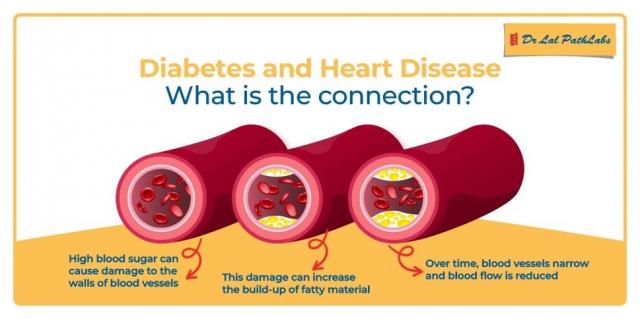Diabetes and Heart disease are two chronic conditions that often go hand in hand. According to the American Heart Association, people with type 2 diabetes have twice the risk of developing heart-related disease as those who don’t have diabetes. This article will explore how diabetes affects the heart, the symptoms of Heart Disease, and ways to prevent it.
How does diabetes cause coronary heart disease?
Diabetes affects how the body processes glucose (sugar) and can cause high blood glucose levels. Over time, if blood sugar levels are not managed, it can damage blood vessels and nerves responsible for proper heart function.
When the arteries that supply blood to the heart are damaged, it can lead to atherosclerosis. It is a condition in which plaque builds up in the blood vessels responsible for providing oxygen and nutrition to the heart.
The problem arises when these cholesterol plaques break apart or rupture. In response, the body sends platelets to mend the rupture, but in the narrow confines of the artery, these platelets can obstruct blood flow. This obstruction prevents the delivery of oxygen-rich blood to the heart, weakening the heart muscles and causing a heart attack.
People with diabetes also have a heightened risk of heart failure, a serious condition where the heart struggles to pump blood effectively. This can lead to fluid accumulating in the lungs, leading to breathing difficulties, or fluid retention in other body parts, particularly the legs, causing swelling.
What are the symptoms of heart disease?
According to the American Diabetes Association, there are a few symptoms that a person with type 1 or type 2 diabetes must know about heart disease. They are:
- Breathlessness
- Near-fainting or fainting
- Fluttering sensation in the chest
- Chest pain (angina), including sensations of tightness or pressure
- Slow heartbeat
- Dizziness or lightheadedness
- Fast heartbeat, not due to a temporary increase in physical activity
- Pain in one or both arms
- Numbness or weakness in the legs
- Pain in the neck, jaw, throat, back, or upper abdomen
- Extreme fatigue
- Nausea and vomiting
How to reduce the risk of heart disease?
People with type 1 diabetes can take the following steps to reduce their risk of developing type 2 diabetes and heart disease:
- Adopt a healthy diet
Maintain a healthy diet by including adequate fresh fruits, vegetables, lean proteins, and whole grains. Cut down on processed foods like chips and sweets, and avoid trans fats. Opt for water over sugary drinks and limit alcohol intake.
- Maintain a healthy weight
Even a small weight loss (around 5–10% of body weight) can make a significant difference if a person is overweight. This helps lower triglycerides and blood sugar, reducing the risk of heart disease.
- Keep the ABCs in check
A: Regularly check A1C levels to monitor average blood sugar over 2-3 months. Always try to stay within the target range.
B: Keep blood pressure below 140/90 mm Hg or as advised by the doctor.
C: Manage cholesterol levels. Focus on maintaining high HDL (good cholesterol) and lowering LDL (bad cholesterol) and triglycerides.
- Exercise regularly
Regular physical activity makes the body more responsive to insulin, which is vital for managing diabetes. Aim for at least 150 minutes per week of moderate-intensity exercise, such as brisk walking.
- Avoid stress
Stress can impact blood pressure and lead to unhealthy habits like overeating or excessive alcohol consumption. Combat stress by seeking support from friends and family, trying meditation or deep breathing, engaging in physical activity, or consulting with a mental health counsellor.
- Quit smoking
As smoking is a major risk factor for heart disease, quitting it can greatly decrease the chance of cardiovascular complications.
The connection between type 2 diabetes and cardiovascular disease underscores the importance of proactive health management. Individuals with diabetes must prioritise effective blood sugar control and adopt a heart-healthy lifestyle to mitigate the risk of coronary heart disease. Regular health check-ups, including diabetes screening, are vital for the early detection and intervention of type 2 diabetes and heart disease.
For those concerned about their diabetes status, getting tested is a simple yet powerful step. To keep diabetes and heart disease risk in check, undergo a diabetes test after consulting with a doctor. To book a diabetes test and monitor your health, please visit the Dr Lal PathLabs website.
FAQs
- Does diabetes cause heart palpitations?
Yes, uncontrolled blood sugar levels in diabetes can cause abnormal heart rhythms like atrial fibrillation, resulting in palpitations.
- How does high blood sugar affect the heart?
Elevated blood sugar levels can injure blood vessels and nerves vital for heart function. This can lead to atherosclerosis, raising the risk of heart attack and stroke.
- Can diabetes affect the heart?
Yes, diabetes significantly increases the risk of various cardiovascular conditions like coronary artery disease, heart attack, stroke, and heart failure.
This post first appeared on Swine Flu – Causes, Symptoms, Treatments, Compli, please read the originial post: here

